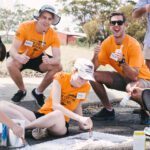Melissa didn’t set out for a career in neuroscience. But after a last-minute swerve in her Honours year, getting a job she wasn’t quite qualified for and undergoing a steep learning curve in the field, she’s now in her second year of a PhD researching concussion.
Melissa Papini is completing a PhD at Curtin, co-supervised by Curtin University’s Dr. Sarah Hellewell and Professor Melinda (Lindy) Fitzgerald. Melissa and Sarah reflect on researching brain injury, their working relationship and how winning runner-up in the national FameLab competition gave Melissa the confidence to not hate public speaking so much.
Melissa:
I had a long break between my undergraduate and postgraduate studies. I did biochemistry, microbiology and anatomy at UWA for my undergraduate and my honours there as well. It was supposed to be in reproductive anatomy but it ended up being a lot more physiology and neuroscience. I’m glad that it was otherwise I wouldn’t be here.
I didn’t think about a PhD until I was working for the Fiona Wood Foundation in paediatric burns at the Children’s Hospital, it was a pretty confronting job but that’s the nature of clinical research. I find it motivating to speak to the people who my work intends to help. I then applied for a job in the lab that I’m now with at Curtin, which I probably was not qualified for. But Lindy took me on. It was a very steep learning curve but it was all so interesting. One day, Lindy asked me if I would consider doing a PhD. Now I’m here.
I am researching concussion, or as we call it, mild traumatic brain injury. The symptoms that you have after a concussion usually go away in a few weeks or months. However, if they last longer than three months, we call it persistent post-concussion symptoms and it can really ruin your quality of life. The symptoms encompass everything from anxiety, depression, difficulty sleeping, headaches, dizziness and nausea.
What we think is that damage to the white matter in the brain continues to develop after the injury, progressing throughout the brain and that’s what causes the symptoms. But it’s subtle microscopic damage and you can’t see it on a regular sort of CT or MRI scan. So, I’m using two different methods, blood biomarkers and diffusion MRI, to visualise and understand the damage at both the acute and chronic phases of injury.
I want this research to contribute to education, advocacy and highlight concussion as an injury that can be serious. Almost everybody has heard of it and yet one of the challenges that we have is recruiting people because of misconceptions, for example, you must be unconscious to have a serious concussion, which isn’t the case at all. I want people to know what concussion actually is, its side effects and to increase general understanding of its broader symptoms.
It’s great to have a research paper but if your research paper stays there and only other researchers read it, it’s great, but you need to have much more of an impact.
COVID has been difficult for us. Because we’re doing human research, we have studies that recruit through the hospitals. During more intense COVID times, we had limits on our research, particularly in-person research. It was much more difficult to do our MRI work because it’s done at a hospital and people didn’t really want to be going into a hospital environment where they could potentially become unwell. Although now we’re basically back to pre-COVID times in terms of attitudes, people are very burnt out and participation in research has decreased since pre-COVID times.
So far, the biggest achievement for me is that I’ve gotten a lot better at public speaking. I hated public speaking. I remember giving my milestone one presentation and my voice wavered with nerves. I said to Sarah, ‘this is a big problem for me, I really need to get better at this,’ and she told me to enter everything; all the speaking things, the three-minute thesis, everything that you can enter. So I did and the more I did, the easier it got. FameLab, the largest public-facing science communication competition, recently came up and I gave it a go. I ended up winning national runner-up. It still feels like it didn’t happen. But the amount of confidence it gave me to be able to speak in public was incredible.
Sarah’s like an encyclopedia. If you’ve got a question about anything you can just come ask her and she’ll give you a thousand different pieces of knowledge and everything that it might be connected to. You shouldn’t be scared to go to your supervisor or feel like you can’t tell them if something is too much or is too hard or you don’t understand it.
The combination of Sarah and Lindy is great. I honestly could not ask for a better pair of supervisors. They’re both very high achieving women and I respect that enormously. They inspire me to do better and be better. Sometimes when you get into PhD, you get really bogged down. Everybody goes through a bit of a low point where you’re overwhelmed but having the two of them to encourage me, making sure that I’m doing a good job and constantly helping me whenever I need it, is the best thing.
Sarah:
I was really thrilled when Melissa wanted to do a PhD. She’s an excellent scientist, an asset to our lab and an excellent PhD student.
Melissa is just about to submit an excellent paper. She has reviewed all the studies that have looked at diffusion MRI as a technique and white matter blood biomarkers and mapped them to say how many studies looked at them together. She then looked at how many studies have linked those different measures of white matter damage to different outcomes. It’s going to be an excellent resource and a real asset for her career and our lab.
There’s this saying: If you’ve seen one brain injury, you’ve seen one brain injury, because everyone is so different.
I love supervising students and nurturing the next generation of researchers. It’s so important to have good supervision. The difference between having a good supervisor and a bad supervisor can make or break someone’s career. I had good supervision myself – my mentors were mostly high-achieving women and I learned so much from them and got so much out of my supervisory relationship. So, I was happy to take on supervision to teach and encourage people.
A PhD supervision style is difficult to define because it is different for every student. My approach when someone starts off in a PhD is that I am more hands-on with them and almost reassure them that it’s okay not to know anything because it’s new. Nothing’s too hard or too complicated. You just don’t know it yet. Then as people progress through their PhD I become more hands-off and let them take on their own research directions and explore their own questions.
About the researchers:

Melissa Papini
Melissa is a PhD candidate supervised by Dr Sarah Hellewell and Professor Melinda Fitzgerald. Her research focuses on concussion, investigating novel blood and neuroimaging biomarkers that can aid our understanding of white matter damage after injury and how this relates to recovery.

Dr. Sarah Hellewell
Sarah is a Research Fellow in Neurotrauma at Curtin University and the Perron Institute for Neurological and Translational Science. Her research uses MRI, fluid biomarkers and functional tests to understand how injury can alter brain structure and function, and how this translates to cognitive and neuropsychological outcomes.



